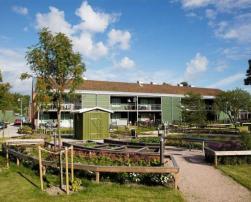
UK neutrality target? Retrofitting at scale
Retrofitting the UK’s buildings at scale is vital for meeting housing needs, reducing carbon emissions, and ensuring a fair, sustainable transition for all.
Luca Papapietro

Detecting building material with Artificial Intelligence (AI): toward smart and sustainable urban planning
A new framework using deep learning and remote sensing accurately identifies building materials, enabling sustainable urban planning and carbon reduction.
Luca Papapietro

Addressing rapid urbanisation in India sustainably
The critical role of strategic partnerships lies in driving innovation to tackle India’s urbanisation challenges by reducing carbon emissions through sustainable building practices and collaborative efforts.
Luca Papapietro

CCRI Knowledge Hub launches its mentoring programme
Funded by the EU, the CCRI Knowledge Hub just launched the first edition of its mentoring programme to foster the deployment of circular economy practices in European cities and regions. Mentors (selected experts) will provide tailored guidance on various circularity sectors and related aspects.
Marta Falsini

Reducing carbon footprint in construction: what are our options?
Construction accounts for 40% of global emissions. Strategies such as using sustainable materials, optimised processes and green certifications reduce emissions, waste and costs while delivering long-term environmental, economic and social benefits.
Luca Papapietro

Northumbria University leads AI-driven construction waste management innovation
Northumbria University is using Artificial Intelligence (AI) to improve construction waste management and sustainability, promoting recycling and circular economy practices.
Luca Papapietro

SUPER-i Toolkit: A holistic solution to combat energy poverty in Europe
The SUPER-i Toolkit emerges as a groundbreaking resource, combining several elements to mitigate energy poverty and pave the way for a more sustainable and equitable future.
Marta Falsini

McKinsey report: Unlocking opportunities in retrofits
A recent McKinsey report, in collaboration with the World Economic Forum, highlights how retrofitting buildings with available technologies can reduce emissions and help achieve net-zero goals in a cost-effective manner, addressing the built environment’s significant contribution to global CO2 emissions.
Luca Papapietro

E-Room: Tackle energy poverty through data and collaboration
A dynamic resource platform has been designed to understand, measure and combat energy poverty. The E-Room offers insights into the structural and socioeconomic factors behind energy poverty. These include poor energy efficiency in buildings, labour market inefficiencies, and limited access to financial, social, and informational resources.
Marta Falsini

Affordable, sustainable living: the EU Affordable Housing Initiative
The EU Affordable Housing Initiative supports 35 districts to become inclusive, energy-efficient, and affordable, tackling Europe’s housing crisis while promoting social equity and climate neutrality by 2050.
Luca Papapietro